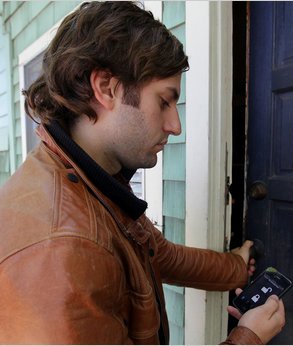 Technology
Technology

Smart phones may make keys obsolete
 (NYTimes): Front pockets and purses are slowly being emptied of one of civilization’s most basic and enduring tools: the key. It’s being swallowed by the cellphone. New technology lets smart-phones unlock hotel, office and house doors and open garages and even car doors. It’s a not-too-distant cousin of the technology that allows key fobs to remotely unlock automobiles or key cards to be waved beside electronic pads at office entrances. What’s new is that it is on the device more people are using as the Swiss Army knife of electronics — in equal parts phone, memo pad, stereo, map, GPS unit, camera and game machine.
(NYTimes): Front pockets and purses are slowly being emptied of one of civilization’s most basic and enduring tools: the key. It’s being swallowed by the cellphone. New technology lets smart-phones unlock hotel, office and house doors and open garages and even car doors. It’s a not-too-distant cousin of the technology that allows key fobs to remotely unlock automobiles or key cards to be waved beside electronic pads at office entrances. What’s new is that it is on the device more people are using as the Swiss Army knife of electronics — in equal parts phone, memo pad, stereo, map, GPS unit, camera and game machine.
The phone simply sends a signal through the Internet and a converter box to a deadbolt or door knob. Other systems use internal company networks, like General Motors’ OnStar system, to unlock car doors.
Because nearly everyone has a cellphone, a number of start-ups, lock companies and carmakers are betting on broad acceptance of the technology.

Juror admits contempt of court for Facebook contact
 (BBC): A juror, who contacted a defendant via Facebook, has admitted contempt of court in the first case of its kind in the UK involving the internet. London's High Court heard that Joanne Fraill, 40, contacted Jamie Sewart, 34, who had already been acquitted in a drugs trial in Manchester. However, the jury was still considering charges against other defendants and the contact led the judge to discharge the jury, and the case collapsed. The pair face up to two years in jail. The case, brought by the Attorney General, Dominic Grieve QC, is being heard by the Lord Chief Justice, Lord Judge, and two other judges.
(BBC): A juror, who contacted a defendant via Facebook, has admitted contempt of court in the first case of its kind in the UK involving the internet. London's High Court heard that Joanne Fraill, 40, contacted Jamie Sewart, 34, who had already been acquitted in a drugs trial in Manchester. However, the jury was still considering charges against other defendants and the contact led the judge to discharge the jury, and the case collapsed. The pair face up to two years in jail. The case, brought by the Attorney General, Dominic Grieve QC, is being heard by the Lord Chief Justice, Lord Judge, and two other judges.
Fraill admitted she had made online contact with Sewart and discussed the case with her while the jury's deliberations were continuing.
She also admitted revealing details of the jury's deliberations during that online conversation – contrary to Contempt of Court Act 1981 – and conducting internet research into a defendant whose case she was trying as a juror during the trial.

Pv6 internet address system receives ‘test flight’
 (CNN): Today hundreds of Internet giants, including Google and Facebook, are participating in the first worldwide "test flight" of a major engineering upgrade to the Internet's infrastructure. Wednesday is World IPv6 Day, a clunky name for an experiment that should be invisible to Web surfers but plays a critical role in keeping the Internet running smoothly. One of the Net's foundational layers is the Internet Protocol, a global communications standard used for linking connected devices together. Every networked device you own — your PC, smartphone, laptop, tablet and other gizmos — has a unique IP address. The problem is that we're running out of them.
(CNN): Today hundreds of Internet giants, including Google and Facebook, are participating in the first worldwide "test flight" of a major engineering upgrade to the Internet's infrastructure. Wednesday is World IPv6 Day, a clunky name for an experiment that should be invisible to Web surfers but plays a critical role in keeping the Internet running smoothly. One of the Net's foundational layers is the Internet Protocol, a global communications standard used for linking connected devices together. Every networked device you own — your PC, smartphone, laptop, tablet and other gizmos — has a unique IP address. The problem is that we're running out of them.
The current system, called IPv4, has the technical capacity to handle 4.3 billion addresses. They're almost all used up: The last remaining batch was assigned out in February. The solution is a next-generation protocol called IPv6. Just as the U.S. telephone system handled soaring growth by increasing the digits in each telephone number, the new IP system — under development for more than 12 years — uses longer addresses to fit more devices into the network.

LIME hosts global maintenance forum on GC
 (CNS): Technicians from all over the world that help keep the international lines of communication open will be visiting Grand Cayman next week for a specialist conference. Fifty members of the Atlantic Cable Maintenance Repair Agreement (ACMA) representing over 36 companies from all corners of the Atlantic Region are coming to discuss the crucial work that this not for profit organization does and to ensure it can keep doing. Local telecommunications firm LIME which is a member of the ACMA is playing host at the Marriot from Monday for the four day conference.
(CNS): Technicians from all over the world that help keep the international lines of communication open will be visiting Grand Cayman next week for a specialist conference. Fifty members of the Atlantic Cable Maintenance Repair Agreement (ACMA) representing over 36 companies from all corners of the Atlantic Region are coming to discuss the crucial work that this not for profit organization does and to ensure it can keep doing. Local telecommunications firm LIME which is a member of the ACMA is playing host at the Marriot from Monday for the four day conference.
Donnie Forbes, Head of Service Support and Delivery, is LIME’s representative and the organizing host for the event. “For 45 years LIME has been keeping the people of the Cayman Islands connected to the rest of the world. Technology has allowed our two core pillars of industry, tourism and finance to grow and develop into the world class businesses that we know today. LIME is delighted to welcome all the ACMA delegates not only to discuss business, but also to give us the opportunity to showcase our beautiful Islands,” he said.
ACMA is a cooperative agreement among more than seventy companies on four continents. It is run by its member companies for the benefit of the cable owners. Its goal is to provide the highest quality repair and maintenance service availableanywhere at the lowest possible price.
Specially-designed cable ships, each with its own dedicated ROV, with experienced crews and the most modern equipment, are available at strategically located base ports throughout the Atlantic Ocean to undertake repairs, wherever and whenever needed. Because of its asset- and cost-sharing methodology, it offers unparalleled service at a fraction of what it would cost to provide to individual systems. And because of its not-for-profit nature, 100% of all savings is shared among the member companies.
The Cayman Islands relies almost totally on submarine cables to keep it connected to the rest of the world. LIME officials said that the firm continues to invest in submarine cables and just this year a new major submarine cable was brought on line. The “East-West” cable links Jamaica and the Cayman Islands in the west of the Caribbean to the British Virgin Islands in the east and lands in the Dominican Republic, one of the key markets in the Caribbean region.
“For businesses and residents alike there’s nothing amusing about an undersea cable break,” LIME said. “After an earthquake of Central America several cables in the Gulf of Mexico were damaged which affected some of our voice and internet traffic. With downtime and restoration costs running as much as $10 million a day on some systems, faults have to be located and repaired swiftly. This requires experience, expertise and state of the art vehicles – all of which are standard with ACMA.”

IT touted as cost solution
 (CNS): The government is planning to introduce more and expand existing on-line and e-services in the hope of making it more efficient for less money. In the Throne Speech delivered to the Legislative Assembly on Monday by the governor, the government has cited the use of information technology as a cost cutting solution for delivering services and information to the public. Duncan Taylor said that computer services would be expanding online government services and implementing advanced automation and business reporting systems. “These efforts will help government agencies increase efficiency, without increasing staff numbers,” he said.
(CNS): The government is planning to introduce more and expand existing on-line and e-services in the hope of making it more efficient for less money. In the Throne Speech delivered to the Legislative Assembly on Monday by the governor, the government has cited the use of information technology as a cost cutting solution for delivering services and information to the public. Duncan Taylor said that computer services would be expanding online government services and implementing advanced automation and business reporting systems. “These efforts will help government agencies increase efficiency, without increasing staff numbers,” he said.
Computer Services’ expansion of the electronic document management system will offer government agencies the ability to revamp processes and procedures, improve workflows, and minimise costs for storing and manipulating paper documents, the governor said. Fom paying fines on-line at the court to submitting information to the Cayman Islands Gazette website, government will be using the internet for more services.
He also said that civil servants would be offered “blended e-learning” to provide them with targeted, accredited training and qualifications through the Civil Service College, in partnership with top universities.
The governor spoke, too, about introducing video links to the prison to reduce the number of journeys inmates on remand have to make to and from the court, which would be both a cost cutting and safety measure. The country’s planned CCTV project will also depend on the upgrading of technology to improve community security.
The Department of Vehicle and Drivers’ Licensing finally has plans to develop e-services for the renewal of drivers’ and vehicle licenses, allowing people to pay on-line and avoid one of the islands' most notorious queues. At Lands and Survey, scanning of all survey files is also expected to be completed this fiscal year to allow full online research facilities for licensed land surveyors and department staff.
The government has been slow to take advantage of the possibilities offered by new technology and in particularly delivering services, the ability for people to pay on line and providing information. Despite having set up an e-business commission, government departments are still not offering comprehensive e-services.
Although nearly every government department and public authority has a website, few utilize them to their full advantage. Many have not been updated since they were established as a tool to assist with the implementation of the Freedom of Information Law.
Speaking at a Chamber of Commerce “Be informed” series presentation on Wednesday evening, the deputy chief officer in the Ministry of Labour talked about plans to re-organise labour, training and pensions. In his speech Vaughan Carter pointed to the fact that the job placement unit is still attempting to match employers to employees with manual lists of candidates and jobs. Immigration and labour service are two areas in particular that many believe could dramatically improve government efficiency and cut costs if more oftheir services were available on line.
However, given that customs has only just begun accepting payments at the office by credit card, any immediate expectations of a revolution in e-government may well be disappointed.
Google to show off mobile wallet for Android phones
(BBC): Google is set to introduce a mobile payments platform that will turn its Android smartphones into a digital wallet. At an event in New York on Thursday, the tech giant is expected to show off the technology, called near field communication or NFC.The technology allows devices to "talk" to one another wirelessly. Consumers wave their phones in front of a reader at a checkout to pay for a purchase or to receive special offers.The Wall Street Journal has reported that the program will initially be launched in New York and San Francisco before being extended more widely across the US.

Digicel accuses LIME of ‘grossly misleading’ 4G claim
 (CNS): In the wake of LIME’s recent announcement that it will be the first telecommunication’s company to bring 4G technology to the Caribbean its regional competitor has accused the firm of misleading messages. In a letter to the Jamaican Observer, Monday, Mark Linehan CEO, of Digicel stated thatthis claim to be the first was not the case. He said LIME would be using HSPA+ technology for the services it is calling 4G but it is not the first to deploy this technology. He said the technology was previously described as 3G+ when launched by Digicel but it has since been reclassified by the ITU.
(CNS): In the wake of LIME’s recent announcement that it will be the first telecommunication’s company to bring 4G technology to the Caribbean its regional competitor has accused the firm of misleading messages. In a letter to the Jamaican Observer, Monday, Mark Linehan CEO, of Digicel stated thatthis claim to be the first was not the case. He said LIME would be using HSPA+ technology for the services it is calling 4G but it is not the first to deploy this technology. He said the technology was previously described as 3G+ when launched by Digicel but it has since been reclassified by the ITU.
“Digicel launched HSPA+ technology in Bermuda and the French West Indies last year (under the banner 3G+). The reason we called it 3G+ is that, at the time, HSPA+ was not considered a 4G technology. However, HSPA+ has since been reclassified by the ITU (International Telecommunication Union) to be counted as 4G,” Linehan wrote in his letter to the Jamaican press.
He said that Digicel already delivers 4G technology – using HSPA+ technology and WiMAX both classified as 4G technologies by the ITU – in the Caribbean and specifically in the Cayman Islands and Jamaica and was the "first" to do so.
The Jamaican Digicel boss said it was gearing up to launch the same technology across the Dutch Caribbean in a matter of weeks and to other markets in the near future.
“LIME's announcement actually raises more questions than answers as to its commitment to the customers of the Caribbean. Here is a company that is making a big deal out of upgrading its outdated 2G networks to EDGE. Meanwhile, Digicel has been delivering EDGE services across all of its 32 markets across the Caribbean, Central America and the Pacific since 2008,” Linehan added about his firm’s rival.
Digicel had already invested $85 million in rolling out HSPA+ and WiMAX services across the region, he said in the correspondence. Last week Cayman’s LIME boss Tony Ritch said that his company would be investing around $80million to roll out what is said was 4G technology.
Describing the service as lightening fast, Ritch claimed LIME was the first in the Caribbean to launch the service. In response to queries on CNS about the technology and whether phones in existing use would work on the new network LIME confirmed that it would not be deploying CDM and admitted that the technology was based on HSPA+.
CNS contacted LIME for comment in connection with the letter from Lineham but the firm said it did not wish to comment at this time.

Existing phones will work on 4G, says LIME
 (CNS): Following the buzz in the wake of LIME’s announcement about the introduction of a 4G network across Grand Cayman before the end of the summer, any concerns that existing phones won’t work on that new superfast network have been allayed by the firm. LIME stated that all existing phones will work on 4G and they will work better. The communication company said it would not be deploying CDMA technology as it rolls in what Cayman Islands LIME manager Tony Ritch said was a network that would blow users minds.
(CNS): Following the buzz in the wake of LIME’s announcement about the introduction of a 4G network across Grand Cayman before the end of the summer, any concerns that existing phones won’t work on that new superfast network have been allayed by the firm. LIME stated that all existing phones will work on 4G and they will work better. The communication company said it would not be deploying CDMA technology as it rolls in what Cayman Islands LIME manager Tony Ritch said was a network that would blow users minds.
The firm has not yet revealed how much the new network will cost users or what rates and packages will be available. It did state however when it comes to international data plans, the Blackberry Passport would remain the same as it is now.
4G is the fourth generation of cellular wireless standards succeeding the 2G and 3G technologies. LIME said the initial deployment of 4G wireless is based on HSPA+ which allows for shared download/upload speeds of 21/11 Mbps in a single mobile sector, with 3 sectors typically deployed at a mobile site.
LIME’s plan to roll out 4G in the Cayman Islands before any other country in the Caribbean was announced this week at a glitzy launched at the Ritz Carlton. The management team said it would eventually revolutionise mobile networks across the Caribbean with an investment of US$80M to finance the major improvements to the regions mobile networks but it will happen in Grand Cayman first
The firm said 4G will also serve as a platform for LIME’s future network development as the protocols are fully compatible with the Long Term Evolution (LTE) technology that will power mobile networks in the future.
With 4G, LIME’s mobile subscribers will have the power to instantly send and receive large files such as videos, music, graphics and photos from enabled wireless devices including mobile phones, tablets, laptops and netbooks. LIME’s customers will also be able to enjoy real-time online activities including video streaming, online gaming and social networking while on-the-go all at the same time as making a phone call.
“People of all ages, especially the young, want to be online all the time and need fast, affordable mobile data service that enable them to do all the things they can now do with a fixed internet connection while on the go,” said Ritch “Our mobile 4G network will ensure that LIME can satisfy customer needs as the insatiable demand for mobile internet service grows.”
Ritch said the move from 2G services, to both EDGE and 4G “will be like going from riding a bicycle to driving a Ferrari,” as it was a massive step forward for mobile service.

LIME bringing 4G to CI
 (CNS): Local telecommunications firm LIME has announced its intention to roll out its 4G network service in Grand Cayman by September. The superfast technology will transform life in the Cayman Islands, general manager Tony Ritch (left) said at a glitzy launch at the Ritz CArlton on Tuesday evening. He said that after forty five years in Cayman the firm had introuced many 'firsts' and this one was particularly impressive. As well as downloading and browsing at lightening speeds on mobile phones, he said, this new generation technology could offer untold opportunities for business and the private sector.
(CNS): Local telecommunications firm LIME has announced its intention to roll out its 4G network service in Grand Cayman by September. The superfast technology will transform life in the Cayman Islands, general manager Tony Ritch (left) said at a glitzy launch at the Ritz CArlton on Tuesday evening. He said that after forty five years in Cayman the firm had introuced many 'firsts' and this one was particularly impressive. As well as downloading and browsing at lightening speeds on mobile phones, he said, this new generation technology could offer untold opportunities for business and the private sector.
The local LIME boss said that third generation technology was not enough for Cayman and that the company recognised the need for more sophisticated technology in this jurisdiction, which was why it intended to move straight from the current EDGE service to 4G to "future proof" the firm's network. The Cayman Islands is the first jurisdiction in the Caribbean where LIME intends to launch 4G, the very latest in communication technology.
“Life in 4G is going to be amazing,” Ritch told the audience, which cheered with appreciation at the announcement. “It is fast, really, really fast. It will blow your mind.”
He explained that the new technology would allow people to pull up immense amounts of data on mobile devices. He said the download and browsing speeds would surpass the type of broadband speeds people are currently used to at home, giving them greater possibilities on the go. “The technology is seamless with no hitches or delays,” Ritch added. “It’s about being connected all the time at higher speeds.”
Talking about the evolution of mobile technology in such a short space of time, he said that just six years ago a one megabyte file would take 6 minutes to download, With 4G technology it would be less than a second.
Ritch said that the decision to move to 4G was as a result of the demand in the Cayman Islands and the continued growth on the local mobile network, as well as the introduction of technologically sophisticated hand held devices such as 4th generation phones and tablets. “It’s about redefining mobility,” he said as he explained the time line for the implementation of the service.
LIME will be rolling out the network in phase one across all of Grand Cayman, which should be completed by September, Ritch said, adding that the network upgrade will be completed across Cayman Brac and Little Cayman by very early next year.
CNS introduces optional log in for users
![]() (CNS): Cayman News Service now has an optional registration process in order to increase the options available to our users and make the site even more interactive. While we have no intention of making log-ins a requirement for people making anonymous comments, one advantage of registering will be to protect a commenter’s real name or pseudonym from being used by an imposter and we are also working on ideas to give registered users more privileges. Over the past two years there have been over 100,000 comments posted on CNS under more than 10,000 different names (including “Anonymous”), and since we introduced the thumbs up and thumbs down on comments in November 2009 there have been well over a million thumb or LOL votes.
(CNS): Cayman News Service now has an optional registration process in order to increase the options available to our users and make the site even more interactive. While we have no intention of making log-ins a requirement for people making anonymous comments, one advantage of registering will be to protect a commenter’s real name or pseudonym from being used by an imposter and we are also working on ideas to give registered users more privileges. Over the past two years there have been over 100,000 comments posted on CNS under more than 10,000 different names (including “Anonymous”), and since we introduced the thumbs up and thumbs down on comments in November 2009 there have been well over a million thumb or LOL votes.
“Based on these statistics, we believe that the comment section on CNS has provided an important way for people in the Cayman community to present their points of view, especially with the fear, constantly expressed to us, that people still have of being victimised for voicing dissenting opinion,” said CNS owner Nicky Watson.
Unfortunately, there will always be those who abuse the system and following several incidents of people “borrowing” the real name of a local person for apparently mischievous purposes, it is now a requirement that commenters who use a real name of an individual or organisation in the “submitted by” tagline must register with a valid email address and a phone number that can be used for verification.
“Several people have been particular targets of malicious imposters, including local lawyer Alan de Saram, and we would like to make it clear that comments made under his name were in fact written by a malicious unknown person,” Watson said. “While we have put several measures in place to prevent this sort of thing happening again, we would like to offer sincere apologies to Mr de Saram. However, we also want to encourage people to use their real names if possible, and the log-in process seems to be the most practical way to try and determine the genuine from the fraudsters.”
Over the past few years, several regular commenters have created a distinctive ‘voice’ on the CNS site but on several occasions someone has assumed their online identity. Now they can register their username, so that only they can use it on CNS, while retaining their anonymity.
“Because we are a small company with limited resources, alongside the great news coverage we try to develop the various interactive functions of the site according to what our readers respond to,” Watson said. “If the interest is there we will also allow registered users to publish their profiles on the site and give them more editing options. In addition, some commenters are just more interesting or entertaining than others, so we are also considering a function that will enable registered users to find more commentsby a particular commenter, but this will depend largely on the response and feedback we get to the log-in process.”
Following the introduction of strong anti-spam software to the system, we were able to reduce the amount of times CNS users have to reproduce the CAPTCHA code and some users will not see it at all. If it does appear, it means the software has identified a comment as potential spam – use of upper case letters for odd words is one possible flag. This means that CNS readers who are concerned about remaining anonymous can still add a comment without leaving any contact details and in most cases this can be as easy as writing in the comment box and clicking “save”.
Much of the work done on the site in the past few months has been to improve its functionality and readers should have found, for example, that the pages load faster. Another recent change to the site is a redesigned menu bar to make it easier to navigate around CNS and quickly find the various sections.
“With all these changes we do our best to eliminate all anomalies and glitches before they come on line. However, Cayman News Service is always a work in progress and we really appreciate all feedback from our readers about any issues that you come across while using the site,” said Watson.
If you have problem, please email our support team at support@support.caymannewsservice.com with as much detail as possible, including the operating system and browser you use, as this helps us enormously. A screen shot can also be very useful. If you have any suggestions as to how we can improve the site, just comment below or email nickywatson@caymannewsservice.com.